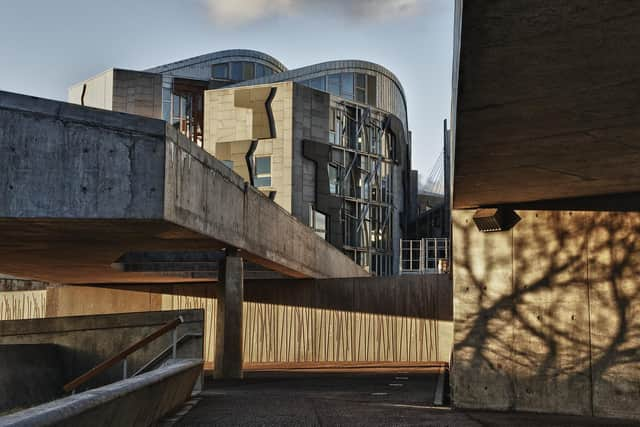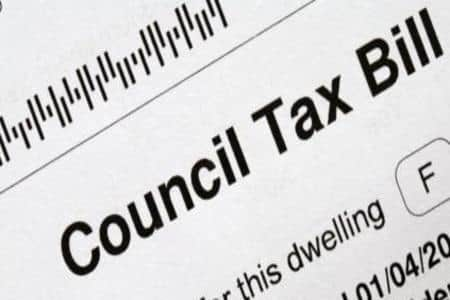Council tax changes Scotland: Ministers urged to overhaul 'ludicrous' council tax system after latest levy freeze from Humza Yousaf
Calls are growing for a wholesale overhaul of Scotland’s widely criticised council tax system amid the deepening financial crisis facing local authorities, with one leading public sector finance expert urging ministers and parliamentarians to “rise to the task” of finding a solution, and condemning the “ludicrous” status quo.
There is growing disquiet in the wake of First Minister Humza Yousaf’s decision to freeze the levy for 2024/25 – a policy that has intensified debate around the wider financial settlement at a time when councils are trying to balance budgets.
Advertisement
Hide AdAdvertisement
Hide AdCriticism of the levy freeze has also come from within Mr Yousaf’s government, with Patrick Harvie, co-leader of the Scottish Greens, warning it was “not a sensible policy for the long term”. He said the existing system was no longer fit for purpose and “out of kilter with the asset wealth” in Scotland.
Earlier this week, local government minister Joe Fitzpatrick said the freeze would “give some certainty” to people over the next year, arguing the measure had “helped councils maintain services while ensuring that households are protected from increasing budgets”.
He said: “We continue to do all that we can to mitigate over a decade of UK government under-investment in public services. Despite the financial challenges faced, we delivered record funding of over £13.9 billion and made available a further £144 million to support reaching agreement with councils to freeze council tax in 2024/25.”
However, Professor David Heald, emeritus professor and honorary senior research fellow at the University of Glasgow’s Adam Smith Business School, told The Scotsman there was a need for everyone in Scottish politics to meet the challenge of finding an answer to the long-standing problem of taxation.
“Scotland needs a serious and informed debate about how to use and reform the taxes which the Scottish Parliament controls,” he said. “Without a tax strategy, there are successive short-term fixes, such as the council tax freeze, which are neither fair nor efficient and build up problems for the future.


Prof Heald, who chaired the Royal Society of Edinburgh’s working group that prepared the working paper, A Fairer Council Tax, added: “It is ludicrous to run a residential property tax on 1991 valuations, meaning that many properties are now in the wrong band. This compromises the credibility of the council tax. The Royal Society of Edinburgh will contribute to a much needed tax debate, but it is up to the Scottish Government and the Parliament as a whole to rise to the task.”
The Scottish Trade Unions Congress (STUC) is one of many organisations within the trade union movement to criticise the existing system. But, crucially, it has crunched the numbers to propose an alternative taxation system, one that is understood to have admirers within the upper echelons of the Scottish Government.
It advocates doing away with the council tax set up, and replacing it with a proportional property tax (PPT), whereby households pay a percentage of the value of their property each year. If the levy was introduced at a rate of 0.7 per cent, the STUC argues it would raise at least £783m more in revenues.
Advertisement
Hide AdAdvertisement
Hide AdRoz Foyer, the STUC’s general secretary, said the PPT model would provide the “most hard-pressed folk” a rebate. “This not only targets those with wealth more fairly, but it can also raise far more revenue for local government in a more proportional, equitable way,” she explained.


Ms Foyer said the “regressive, outdated and woefully inadequate” council tax was “glaringly ignored” by the government in its latest budget. She warned financially starved local authorities could not be credibly expected to deliver public services via a tax that “doesn’t raise anywhere near enough money”.
A key issue, and a long-standing bugbear seized upon by critics of the council tax, is that it is based upon rates that were last evaluated in 1991. The STUC says that no matter what change looks like, the first step has to be a property revaluation as “a matter of urgency”.
“The timescale for this should have started years ago,” Ms Foyer said. “It’s a dereliction of duty by successive governments not to have laid the groundwork for a more progressive system. If actioned, the Scottish Government could have PPT in place by 2028, ensuring our local authorities have a revenue raiser that can better support our vital public services and our fine public sector workers.”
GMB Scotland, one of the nation’s biggest public sector unions, accused Scotland’s political class of “running scared” from reform, for fear of losing the support of voters.
Keir Greenaway, senior organiser for public services at the union, said: “We have been hearing promises of local tax reform for decades, but successive governments have lacked the political will to begin, never mind deliver the change required.
“The original property valuations and tax bands have been outstripped by rising property prices and urgently need to reflect the changed reality. This tax is crucial to the delivery of frontline services like cleansing and social care, but a lack of political leadership and courage has meant it is no longer fit for purpose.”
Mr Greenaway said the government could overhaul the existing system, or replace it with a new and “fairer” alternative. “Whether it is a new system or a retooled council tax, it must be transparently progressive and built on people’s ability to pay,” he said.
Advertisement
Hide AdAdvertisement
Hide AdA spokesman for council umbrella body Cosla said: “Cosla is committed to working jointly with the Scottish Government to explore council tax reform as part of developing a fiscal framework for local government. Cosla leaders wish to see significant progress during 2024 and we look forward to jointly engaging with Scottish ministers, to scope out what areas of reform could look like. However it must be emphasised that any reformed council tax must remain a local tax, with no caps or restrictions.”
Comments
Want to join the conversation? Please or to comment on this article.